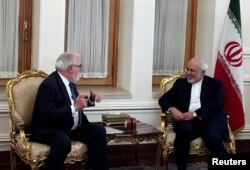Israeli Prime Minister Benjamin Netanyahu begins a three-nation European tour Monday as he seeks support for altering the international nuclear agreement with Iran.
Netanyahu begins his trip in Germany, where is holding talks with Chancellor Angela Merkel before traveling to meet with the leaders of France and Britain.
Britain, France and Germany agreed to the deal with Iran in 2015 along with Russia, China and the United States.
U.S. President Donald Trump announced last month the U.S. was pulling out of what he called a "horrible, one-sided deal," while saying he wants additional restrictions on Iran's ballistic missile program and what he called its "destabilizing activities in the Middle East."
The other signatories have expressed a desire to keep the nuclear deal in place, saying it is working. Britain, France and Germany have suggested addressing other concerns about Iran through a supplemental agreement.
Like Trump, Netanyahu has been a fierce critic of the deal, saying the agreement left Iran with the potential to quickly develop a nuclear weapon when the terms expire.
Iran, which won sanctions relief in exchange for limiting its nuclear program, has said repeatedly its nuclear activity was solely peaceful in nature.
Iranian Foreign Minister Mohammad Javad Zarif said Sunday the U.S. decision to withdraw from the agreement was illegal and he urged the other signatories not to follow suit.
State-run Iranian media said Zarif sent a letter to the foreign ministers of the remaining nations. He asked them to "make up" for the Iranian losses brought on by the U.S. withdrawal if they want to save the deal.
Zarif called the 2015 nuclear agreement the result of "accurate, sensitive and balanced multilateral talks."
"The illegal withdrawal of the U.S. government...especially bullying methods used by this government to bring other governments in line, has discredited the rule of law while challenging the principles of the U.N. Charter and efficiency of international bodies," Zarif wrote.






